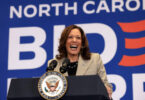By Mia Ping-Chieh Chen
BU News Service
BOSTON — Improved public transportation is a better solution than congestion pricing to addressing lengthy commutes, Rep. James Hawkins, D-Attleboro, said.
Hawkins made his remarks after a hearing where advocates called for adjusting roadway tolls, depending on the time of day, in an attempt to reduce jammed roads.
While higher prices could change some behavior, “I don’t think many people have many choices,” he said. “You wouldn’t choose to go in during the rush hour.”
The hearing was before the Legislature’s Committee on Transportation, where advocates estimated drivers in the greater Boston area “waste more than $2,200 stuck in traffic” per year.
Several bills before lawmakers urge the state Department of Transportation to implement a program for variable pricing of toll rates, including fee increases at peak hours and off-peak discounts.
Two bills focus on the Sumner, Callahan and Ted Williams tunnels and the other would enact full statewide implementation. The bills do not define the time period of the peak and off-peak hours.
Chris Dempsey, executive director for the group Transportation for Massachusetts, said nine of the country’s 10 largest metropolitan areas have implemented congestion prices, including Los Angeles and New York, places known for traffic.
“These are places that have proven that this tool can work and be a part of the broader solution that we need to address this traffic crisis,” he said.
Dempsey said a study by a data analytics company in February found Boston has the worst and costliest traffic in the nation, but is the only city of the 10 largest metro areas without any form of congestion pricing. Other regions have adopted robust tax credits and discount programs for low-income drivers.
“Traffic is not unique to Massachusetts, but we have largely been throwing up our hands in frustration or even adopting policies that make things worse,” Dempsey said. “Other regions around the country are tackling this problem head-on by providing pricing incentives for where and when people drive.”
However, Gov. Charlie Baker has opposed congestion pricing. According to State House News Service, Baker has stated that increasing the price to drive at peak times would have a disproportionate impact on commuters who are not flexible with their schedules. He has vetoed legislation that would have piloted a program.
Baker instead supported the development of “managed lanes,” which drivers could pay to use to travel faster. The proposal followed the unveiling of the results of a study he ordered last year that concluded congestion has economic and environmental impacts
Hawkins supports another alternative. Increasing the frequency of the commuter rail in Attleboro to every 15 minutes, he said as an example, would allow more people to get into Boston and encourage people to not use their cars.
At a recent forum with advocacy group TransitMatters, Hawkins discussed the possibilities of electric trains on the MBTA’s Providence Line. It has the highest ridership, with more than 25,000 daily, and is also the only line with full electrified infrastructure available. He said the electric trains can accelerate faster and are more reliable than diesels, which often break down and delay the commuter rail service. The electrified system would also save time on turnarounds.
“That’s where I think we need to put our focus,” Hawkins said, adding that he agrees there’s a possibility to increase rush-hour toll rates and improve public transportation at the same time.
“I love driving my car, but if the train were better, I’d be taking the train,” he said.
This article was originally published in the Attleboro Sun-Times.





